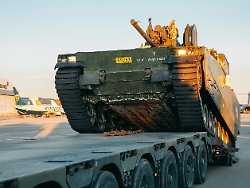Armed Forces and Missile Defense
NATO aims to strengthen the eastern flank in the long term
3/15/2022, 6:13 p.m
Russia’s attack on Ukraine gave NATO a wake-up call. Secretary General Stoltenberg expects a discussion about the long-term strengthening of the eastern flank with more armed forces, air and missile defense and a higher frequency of military operations.
NATO is considering a significant and permanent reinforcement of the eastern flank after Russia’s attack on Ukraine. At a meeting of defense ministers this Wednesday, a discussion about the long-term strengthening of security in all areas should be started, explained Secretary General Jens Stoltenberg in advance in Brussels. This could include stationing substantially more forces in the eastern part of the alliance and having more equipment there. In addition, significantly more air and naval operations, a strengthening of air and missile defense and additional and larger exercises will be considered.
“I expect that we will task NATO’s military commanders with developing options for our summit in Madrid in June,” Stoltenberg added about the forthcoming deliberations of the defense ministers.
Worst threat “in decades”
Shortly after it began, the heads of state and government of the NATO countries described Russia’s attack on Ukraine as the “most serious threat to Euro-Atlantic security in decades”. At the same time, it was said at the time: “In view of Russia’s actions, we will draw all necessary conclusions with regard to NATO’s deterrence and defense capabilities.”
In the short term, NATO countries have already sent thousands of additional soldiers to the Baltic States and countries like Romania. In addition, among other things, airspace surveillance in the eastern alliance area was significantly expanded.
Meanwhile, Ukrainian President Volodymyr Zelenskyy has admitted that his country’s prospects of joining NATO are unlikely. “It is clear that Ukraine is not a member of NATO, we understand that,” Zelenskyy said during an online appearance to representatives of the northern European military-cooperative Joint Expeditionary Force. “For years we have heard about open doors, but now we have also heard that we are not allowed to enter there and we have to accept that,” Zelenskyj added. “I am glad that our people are beginning to understand this, to count on themselves and on our partners to help us.”
